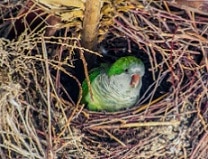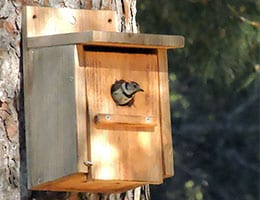 The concept of nest comes from the Latin nidus . The term refers to the shelter that birds build with branches , straw and other elements.
The concept of nest comes from the Latin nidus . The term refers to the shelter that birds build with branches , straw and other elements.
Animals develop nests to lay and hatch eggs . Once the babies are born, they are fed and protected inside the structure, which is usually located in a tree . In any case, there are nests that form in holes, openings and even on the surface.
The characteristics of the nests depend on the species . They are usually used until the hatchlings begin to fend for themselves. At that point, the nests are abandoned.
In the case of birds , nests can be dug into the ground, developed from a mound, constitute a cavity, be bowl-shaped or hanging, to name a few possibilities. It is common for them to install them in places that are difficult to access so that predators cannot reach them easily.
Beyond birds, some reptiles , insects , arachnids and even mammals also make nests. Squirrels, for example, create nests that can be similar to some bird nests. In this case, of course, no eggs are laid in the nest, although the place is used to care for the new specimens.
There is also the concept known as a nest box or bird house , a cavity created by humans for certain birds or bats to inhabit. Given that the economic activities of our species, such as crops and logging, constantly reduce the number of trees and also prevent those that remain from reaching enough age for animals to take advantage of their cavities to nest, it is necessary to create these artificial houses . .
This compensation measure for the destruction caused by our species pursues the objective of maintaining a fauna of birds and other flying species in regions that no longer have their natural characteristics. In other words, life in secondary forests is intended to continue in a similar way to that of a primary one.
A secondary forest is called a forest of little age, whose main plants are usually of the same age. Another name it receives is renewal . Its origin is usually due to a series of alterations in the environment , whether natural (glacial erosions, landslides, fires) or anthropogenic (arsoned fires, burning, massive deforestation and abandonment of the area).
In contrast, a primary forest (also known as virgin or primeval ) is a large space of forest vegetation that human beings have not exploited, fragmented or affected in any way. Their wealth, therefore, is priceless.
 Nest boxes are made with holes of different diameters, depending on the species for which they are intended, since if they were all the same size , the smaller species would have less chance of remaining in the nests because the larger ones would throw them out.
Nest boxes are made with holes of different diameters, depending on the species for which they are intended, since if they were all the same size , the smaller species would have less chance of remaining in the nests because the larger ones would throw them out.
In addition, with a hole of the right diameter the chances of attacks by predators are reduced. Another measure that also aims to maximize safety is to locate the hole on the face furthest from the surface on which the house is fixed, so that snakes cannot reach it easily.
The nest boxes of bats are different from those of birds in two main aspects: they do not have a circular hole on the front face but rather an opening at the bottom; They are not usually installed in trees but on the walls of certain buildings.
A nest, on the other hand, is called the place where certain things that are not material originate: “This project is a nest of conflicts,” “Our club is a true nest of champions,” “The official newspaper is nothing more than a "nest of slander and insults aimed at opposition leaders."
